NOTE: This article does not apply to anyone accessing Zoom meetings via a browser
It is recommended to install the latest version of the Zoom desktop client, Zoom mobile app, or Zoom Progressive Web Application (PWA) for the best Zoom experience. For a comparison please see
To determine which version of the Zoom desktop client or Zoom mobile app you are using please see
Some college, schools and units may require administrative credentials to perform updates on applications like Zoom. Please contact your local desktop support group for assistance.
You'll find instructions below on updating the following Zoom desktop clients and mobile apps:
Questions?
If you encounter issues updating Zoom, please contact your local desktop support group if your device is managed by a department. If your device is unmanaged please contact the UT Service Desk at 512-475-9400 or https://ut.service-now.com/utss/createTicket.do
Update Zoom on Windows
- Sign in to the Zoom client. See steps at https://zoom.its.utexas.edu/signing-in-and-out-zoom
- Click on your profile icon and select Check for Updates.
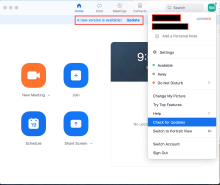
-
Click Update
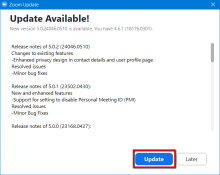
-
The Zoom client will install and prompt you to login.
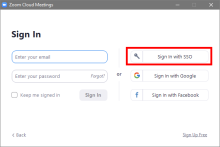
-
Enter utexas as the domain.
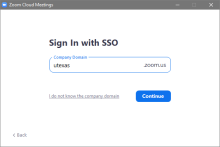
-
Login with your UT EID and password.
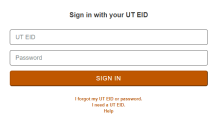
Update Zoom on Mac
-
Sign in to the Zoom client. See steps at https://zoom.its.utexas.edu/signing-in-and-out-zoom
-
Click on your profile icon
-
Select Check for updates

-
Click Update
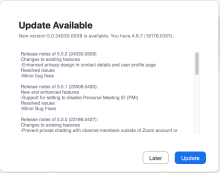
-
Select Install
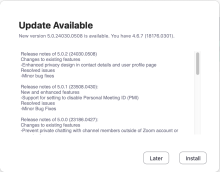
-
Once the update is complete, sign in with SSO

-
Enter utexas as the domain

-
Sign in with your UT EID and password

Update Zoom on Mac (Legacy)
If updating from a legacy version of Zoom, the installer may not complete. In this scenario uninstall your current version of Zoom and install the latest Zoom version.
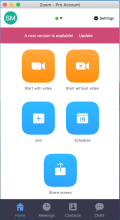
Step 1: Uninstall Zoom Client for Mac
-
Ensure Zoom app is closed
-
Open Finder
-
Select Go at the top of your screen.
-
Select Go to Folder...
-
Once opened, input ~/.zoomus/
-
Move ZoomOpener to your trash
-
Repeat steps 3 through 5 for the following folders and files
-
Folder: /Applications/ Move to Trash: zoom.us.app
-
Folder: ~/Applications/ Move to Trash: zoom.us.app
-
Folder: /System/Library/Extensions/ Move to Trash: ZoomAudioDevice.kext
-
Folder: ~/Library/Application Support/ Move to Trash: zoom.us
Note: If you receive the following message, “The item “ZoomOpener” can’t be moved to the Trash because it’s open”, a Zoom background process is open. Follow steps below to resolve
- Click on the Finder icon in your app dock.
- Select Applications from the Favorites list
- Scroll down and double-click on Utilities.
- Double-click on Activity Monitor.
- In the Search bar type “Zoom”
- Highlight ZoomOpener
- Click on the X in the upper left corner of the window
- Click Quit to confirm that you want to quit the ZoomOpener process
- From the ~/.zoomus/ folder, move ZoomOpener to your trash
Once completed, you can reinstall Zoom from the Download Center
Step 2: Download Zoom Client for Mac
-
Visit the Zoom Download Center: https://zoom.us/download
-
Open the Zoom.pkg file in your Downloads folder
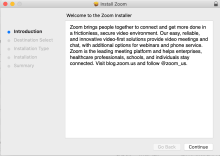
-
Click Continue
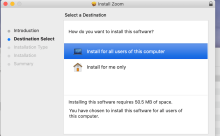
-
Click Install
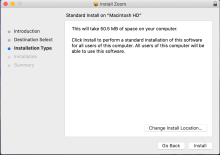
-
Enter local administrator credentials
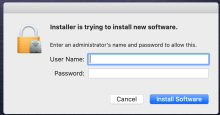
-
Click Close
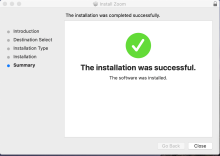
Update Zoom on iOS
- Download the Zoom app from the Apple Store for the most up to date version.

- Sign in with your Apple ID
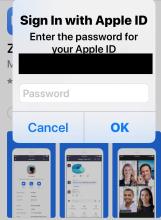
- Click Open

- Sign in

- Select SSO
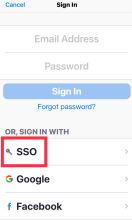
- Enter utexas as the company domain
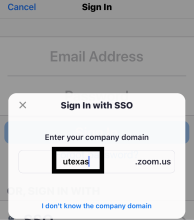
- Sign in with your UT EID and password

- Click Open to open the Zoom application
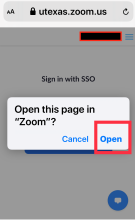
Update Zoom on Android
- Open the Google Play Store

- Type Zoom into the search bar and select Install

- Once installed, click Open

- Enter utexas as the company domain and select continue
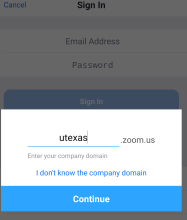
- Sign in with your UT EID and password

Update Zoom on Chromebook
On November 5, 2022, Zoom will be ending support for the ChromeOS client and are asking all customers to migrate to Zoom’s Progressive Web Application (PWA)
For instructions on setting up Zoom PWA please see
https://support.zoom.us/hc/en-us/articles/4403638230925-Using-Zoom-for-…

